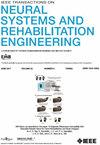Decoding a Cognitive Performance State From Behavioral Data in the Presence of Auditory Stimuli
IF 4.8
2区 医学
Q2 ENGINEERING, BIOMEDICAL
IEEE Transactions on Neural Systems and Rehabilitation Engineering
Pub Date : 2024-11-11
DOI:10.1109/TNSRE.2024.3495704
引用次数: 0
Abstract
Cognitive performance state is an unobserved state that refers to the overall performance of cognitive functions. Deriving an informative observation vector as well as the adaptive model and decoder would be essential in decoding the hidden performance. We decode the performance from behavioral observation data using the Bayesian state-space approach. Forming an observation from the paired binary response with the associated continuous reaction time may lead to an overestimation of the performance, especially when an incorrect response is accompanied by a fast reaction time. We apply the marked point process (MPP) framework such that the performance decoder takes the correct/incorrect responses and the reaction time associated with correct responses as an observation. We compare the MPP-based performance with two other decoders in which the pairs of binary and continuous signals are taken as the observation; one decoder considers an autoregressive (AR) model for the performance state, and the other one employs an autoregressive-autoregressive conditional heteroskedasticity (AR-ARCH) model which incorporates the time-varying and adaptive innovation term within the model. To evaluate decoders, we use the simulated data and the n-back experimental data in the presence of multiple music sessions. The Bayesian state-space approach is a promising way to decode the performance state. With respect to individual perspective, the estimated MPP-based and ARCH-based performance states outperform the AR-based estimation. Based on the aggregated data analysis, the ARCH-based performance decoder outperforms the other decoders. Performance decoders can be employed in educational settings and smart workplaces to monitor one’s performance and contribute to developing a feedback controller in closed-loop architecture to improve cognitive performance.从听觉刺激下的行为数据中解码认知表现状态
目的:认知表现状态是指认知功能的整体表现,是一种无法观测到的状态。在解码隐藏的表现时,获得信息丰富的观察向量以及自适应模型和解码器至关重要:我们使用贝叶斯状态空间方法从行为观察数据中解码性能。根据成对的二元反应和相关的连续反应时间形成观察结果,可能会导致对表现的高估,尤其是当错误的反应伴随着快速的反应时间时。我们采用标记点过程(MPP)框架,使性能解码器将正确/不正确的反应以及与正确反应相关的反应时间作为观察结果。我们将基于 MPP 的性能与其他两种解码器进行了比较,其中一种解码器将二进制信号和连续信号对作为观察指标;一种解码器考虑了性能状态的自回归(AR)模型,而另一种解码器则采用了自回归-自回归条件异方差(AR-ARCH)模型,该模型在模型中加入了时变和自适应创新项:为了评估解码器,我们使用了模拟数据和多音乐会话情况下的 n-back 实验数据:贝叶斯状态空间方法是一种很有前途的解码表演状态的方法。就个体角度而言,基于 MPP 和 ARCH 的性能状态估计优于基于 AR 的估计。根据汇总数据分析,基于 ARCH 的性能解码器优于其他解码器:意义:性能解码器可用于教育环境和智能工作场所,以监测个人性能,并有助于开发闭环架构的反馈控制器,从而提高认知性能。
本文章由计算机程序翻译,如有差异,请以英文原文为准。
求助全文
约1分钟内获得全文
求助全文
来源期刊
CiteScore
8.60
自引率
8.20%
发文量
479
审稿时长
6-12 weeks
期刊介绍:
Rehabilitative and neural aspects of biomedical engineering, including functional electrical stimulation, acoustic dynamics, human performance measurement and analysis, nerve stimulation, electromyography, motor control and stimulation; and hardware and software applications for rehabilitation engineering and assistive devices.

 求助内容:
求助内容: 应助结果提醒方式:
应助结果提醒方式:


